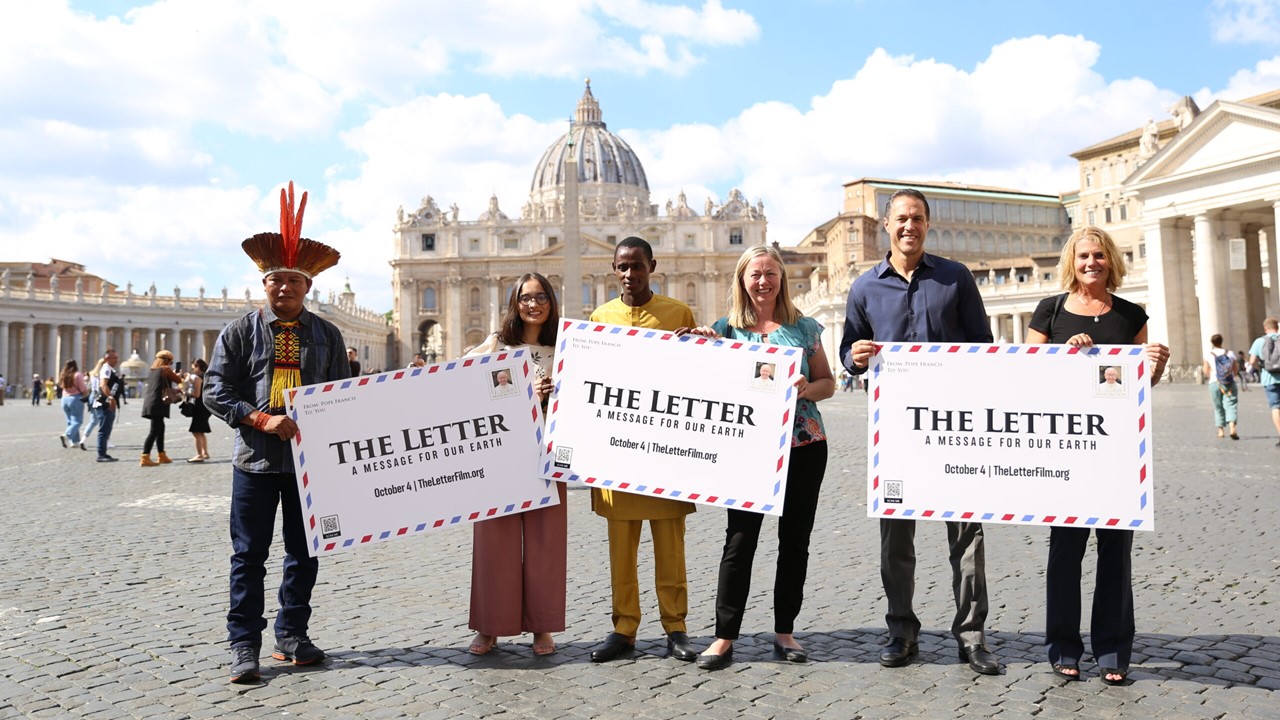Vatican City : “The Letter: A Message for Our Earth,” a high-profile ecological documentary based on Pope Francis' groundbreaking teaching document Laudato Si’, is an unprecedented call to action for climate change, featuring the Holy Father’s dialogues with activists from the Brazilian Amazon, India, Senegal and the U.S.
The global premiere of 'The Letter' film, with the participation of Pope Francis, took place on Tuesday, October 4, the Feast of St. Francis of Assisi in the Vatican's New Synod Hall. The premiere was also attended by other leaders in the Church, including Cardinal Pietro Parolin and Cardinal Michael Czerny, the scientific community, ambassadors and press.
The documentary is directed by Emmy-winning director Nicolas Brown (“Serengeti Rules”), produced by Oscar-winning 'Off The Fence Productions' and presented by YouTube Originals. October 4th also marked the Holy See’s official entry into the Paris Agreement on climate change.
More than four years in the making, "The Letter" follows the story of five people, each representing groups often marginalized in international environmental deliberations, on their way to Rome for a meeting with the pope to discuss Laudato Si' and the growing global threats of climate change and rapid biodiversity loss. They include Arouna Kandé, a climate refugee in Senegal; Cacique Dadá, an environmental defender and leader of the Maró Indigenous territory in the Brazilian Amazon; Ridhima Pandey, a youth climate activist from India; and Greg Asner and Robin Martin, biologists studying coral reefs in Hawaii.
The film features exclusive footage from their encounter with Francis, whose words serve as a spiritual guide alongside the personal stories and scientific findings throughout the documentary. After their papal meeting, the group then travels to Assisi, the home of St. Francis, whose "Canticle of the Creatures" provided the name to the pope's encyclical.
Experts estimate that by 2050 some 1.2 billion people will be displaced globally due to climate change.
Vatican Secretary of State, Cardinal Pietro Parolin, had hosted and recalled an event earlier in the day with ambassadors and other leaders to discuss how to accelerate the implementation of the Paris Agreement.

Raising awareness
"Our original vision was, 'Can faith and science together somehow unite to save the planet?' And that was a real great foundation for me for starting the project and coming on board," Nicolas Brown, the writer and director told EarthBeat in a wide-ranging interview ahead of "The Letter" premiere.
Arouna Kandé, one of the documentary's protagonists, at a young age was forced to leave his home village in Senegal due to desertification. He moved to a coastal city, where the sea-levels are rising. Rather than give up, Arouna persevered. He is now a university student and he is developing a new NGO to lead the next era of sustainable development in his country.
Arouna suggested he is one of millions that have both firsthand experience of the climate crisis, and possesses knowledge about what it will take to solve it.
Abuse of Amazon
In the wake of Pope Francis' Synod on the Amazon, the film features Chief Cacique Dada from the territory, who brought attention to the exploitation and devastation of the region, and how indigenous are those protecting some 80 percent of the world's biodiversity.
American marine biologists and spouses, Dr. Greg Asner and Dr. Robin Martin, who are leading efforts to bring attention to the suffering of wildlife, warned that their efforts in coral protection are essentially a race against time, noting that if temperatures rise even slightly, 99 percent of coral reefs will be at significant risk.
Children and future generations will suffer most
Ridhima Pandey, a 14-year-old high school student, who was a member of groundbreaking lawsuits and complaints to hold governments accountable for their climate inaction. She founded an NGO to help young women become climate activists and had paused her school exams in order to be present.
Ridhima lamented how the young and future generations will be the ones to suffer from the abuse of earth and carelessness worldwide.
On the basis of what she has witnessed in India, she said she has 'nightmares.'
In fact, the film demonstrates the individual 'nightmares,' imagined or lived, by each of the protagonists, as they witnessed the effects of climate change on their reality.
It offered chilling accounts of territories, the sizes of entire nations, destroyed, flooded or burned due to climate catastrophes.
Dr. Lorna Gold, another protagonist of 'The Letter' and the president of the Board of Laudato Si’ Movement, emphasized the need for sharing narratives and stories, in order to inspire and motivate action. She said first we need to become heartbroken, seeing what is really going on, in order to rise up and react.
The film also demonstrated how the recent wildfires in Australia destroyed an incredibly vast territory.
-VN/Variety/Earthbeat